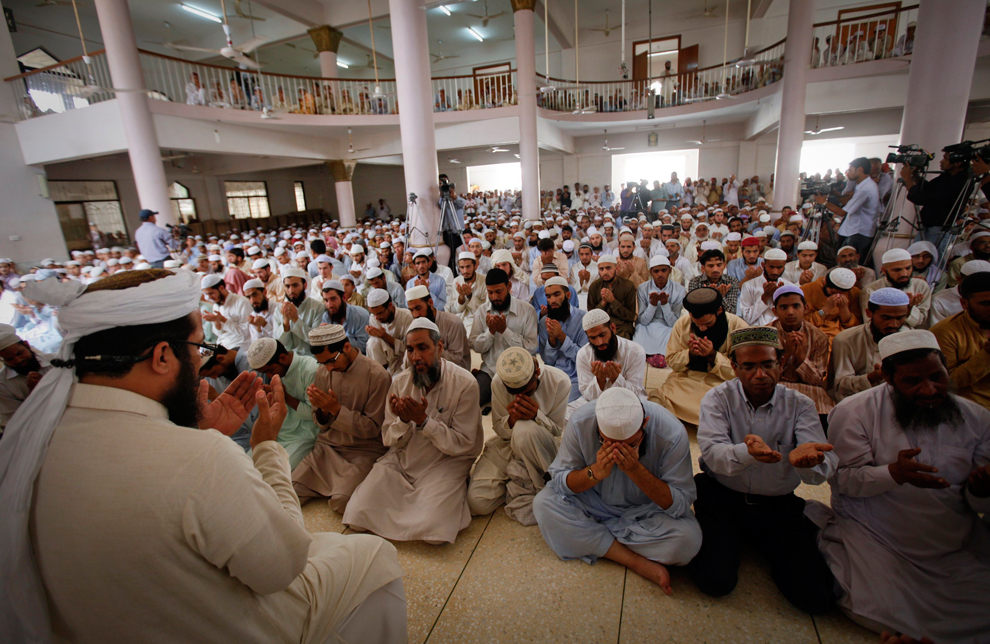With infections nearing 2.6 million and more than 178,000 deaths worldwide, the novel coronavirus is not showing any signs of slowing down.
Countries around the world have been forced to shut down public spaces and suspend all mass gatherings by statutory orders in order to ensure social distancing, the only viable solution there exists in the absence of any cure for the novel coronavirus.
As far as Muslim countries are concerned, they have also been devastated by the coronavirus pandemic and forced to undertake strict precautionary measures.
All major Muslim countries have unequivocally directed their citizens to offer their prayers at homes amid the pandemic except for Pakistan.
With Ramadan just days ahead, the following countries have placed restrictions on Ramadan congregational gatherings and directed their citizens to pray at homes in light of different Ahadees:
- Saudi Arabia
- Malaysia
- Egypt
- Iraq
- Kuwait
- Morocco
- Jordan
- Qatar
Even the Jerusalem Islamic Waqf Council has decided to suspend congregational Ramadan prayers at Al-Aqsa Mosque.
Pakistan, on the other hand with its own unique take on Islam, has chosen to keep the mosques open to organize congregational Friday, Taraweeh, and Eid prayers despite the daily increasing tally of Coronavirus cases.
Though the government, after deliberating with senior clerics of all sects, has enacted certain conditions to enforce social distancing measures during congregational Ramadan prayers, the real impact of this decision could only be gauged after Ramadan. Implementation of such measures in rural areas is also close to impossible especially during the holy month and with limited resources.
Leading clerics like Tariq Jameel and Qibla Ayaz have also been explaining in detail what Muslims ought to do in times like these in light of Sunnah.
Unfortunately, most clerics have played down the fatal viral threat and several instances of public defiance of lockdown forced the government to agree to their demands.
Pakistan has always been a staunch proponent of Muslim unity. Sadly, it has chosen to act opposite to the Muslim world at a time when unity is most needed. Experts and doctors have asked the government to reconsider the allowance of congregational prayers since this could be the make or break decision in Pakistan’s fight against COVID-19.
Do you think Pakistan should have stood with Muslim world during the pandemic? Post your thoughts in comments section.



























Pakistan should not look at other Muslim countries. Pakistan should look at Quran, and How the Prophet SAWW and his SAHABA acted in these times.
Secondly, fact check is the media has taken things out of proportion, and sane people across the world have realized that pandemic is there, but not as ballooned as it’s shown.
Thirdly, when ever we have a health, legal, academic, social, etc issue, we go to the Specialist of that field. So the article gives a clear impression that author has given given his own perception of the issue, and took a one sided opinion, who are not experts related to matters of Deen.
Risky article. Atta should look into it.
ناچ نہ جانے آنگن ٹیڑھا
Pakistani mosques are open because Pakistanis know some special dua to protect against corona that other muslims around the world dont know
How long can a country survive on a lockdown?
well this virus is gonna stay with the world population for a while atleast 7-8 months so how long can you enforce a lockdown its only feasible for a month or two because after that every countries’ economy will be in huge shambles if they still follow the lockdown. So restrictions have to ease(with precautions) otherwise its a doomsday scenario for the economy
LOL !
Thats why toll is 10k nah ?
correct your English first toll means death which is around 250+
cases are 10k+…..so what considering our population of 210 million thats still a safer zone, every major country in the world have cases’ in excess of 20k-30k+.
How about you give an answer to the issues i addressed in my comment?
how long can a lockdown be feasible for a developing country?
Does any developing country have financial surplus to mitigate this shock in longer terms?
Think with a clear head and you will get your answers.
This suffer is because of their own deeds…Even those countries who took precautionary measures right after when it started spreading are doomed with its fast impact on environment, including rich countries too…What is Pakistan infront of them ? The way how it is rapidly spreading here is insane…After every day, the stats increase by 1 thousand. People are non-sense (Except those who respect the Grvnt orders) There are still crowds on the roads, People aren’t keeping social distances. This nation is dead from the inside
Each country should implement its own strategy which works best for them. Pakistanis should know by now that the measures taken by rest of the world do not work for Pakistan and we need to think out of the box to devise solutions that are best for us in light of the mentality of People.
When mosques were closed, people began to gather at rooftops of their homes and flats to offer namaz. So the purpose of distancing people is defeated by such restrictions. Govt. should realize that people will find a way. Thus they should come up with a solution that will be good for the people and prevent spread of virus. As an example, govt. can do following:
1. Monitor temperatures of people coming into mosques
2. No one should be allowed without a mask.
3. Ablution area (which is the most high risk area for spread of virus as people spit and sit very close to each other) should be closed to public and only staff of masjid be allowed to use washrooms and ablutions area.
4. Children/women should not be allowed inside masjid (as Jamaat is not obligatory for them)
5. Water Coolers be banned inside masjid as people can transfer virus through sharing cups.
6. Iftar and sehar be banned inside masjid.
With such restrictions, spread of virus can be controlled and people can also remain happy. People will follow instructions that are logical and when they know govt. cares about their sentiments and listens to their rightful demands.